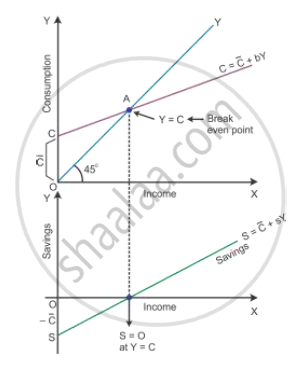Advertisements
Advertisements
Questions
Given consumption curve, derive saving curve and state the steps taken in the process of derivation. Use Diagram.
Outline the steps required to be taken in deriving saving curve from the given consumption curve. Use diagram
Give a consumption curve, outline the steps required to be taken in deriving a saving curve from it. Use diagram
Outline the steps in the deriving saving curve from the given consumption curve. Use Diagram.
Solution
In the diagram, the consumption curve is given as `barC+bY`, where `barC` represents the autonomous consumption, Y is income and b is the rate at which C increases corresponding to an increase in Y. The aggregate supply curve is the 45° line. Consumption is equal to income at Point E.

Derivation of saving function from consumption function:
`-barC` is the saving function where negative savings are equal to autonomous consumption at Y = 0. This is shown on the negative axis in the lower panel at Point S. Here, all the income is spent on consumption expenditure. Hence, there is no saving which is shown as the breakeven point. After this point, S and Y are joined to have a straight line sloping curve.
APPEARS IN
RELATED QUESTIONS
Explain the concept of 'deficient demand' in macroeconomics.
State components of Aggregate demand ?
Explain the role of 'Open Market Operations' in reducing Deflationary Gap
What is 'consumption function'?
Define or Explain the following concept:
Aggregate Supply
Write Short note on:
Marginal Propensity to Consume
State with reason whether you agree or disagree with the following statement.
Aggregate demand depends only on the consumption expenditure.
Answer in detail.
Explain the determinants of aggregate demand.
Write explanatory answer.
What is 'aggregate supply'? Explain the determinants of aggregate supply.
Discuss the working of the adjustment mechanism in the following situations:
Aggregate demand is greater than the aggregate supply.
Aggregate supply is equal to ______.
Identify the correctly matched pair from Column A to Column B:
| Column A | Column B |
| (1) Y = AD | (a) Level of output at full employment |
| (2) Forward Multiplier | (b) Withdrawal of investment decreases income |
| (3) Paradox of Thrift | (c) People save less or same as before |
| (4) Multiplier (k) < 1 | (d) 0 < MPC < 1 |
Which of the following statement is true?
It is seen that the private consumption expenditure, private investment expenditure, and ex-ante savings have reduced the ______ in the economy.
“In an economy Planned spending is more than Planned output”.
Explain its impact on the level of output, income and employment.
If planned savings exceeds planned investments in an economy, explain its likely impact on income, output and employment.
If aggregate demand exceeds aggregate supply in a situation of full employment, what will be its impact on the economy?
